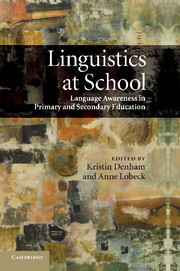Book contents
- Frontmatter
- Contents
- Notes on contributors
- Foreword: The challenge for education
- Introduction
- Part I Linguistics from the top down: encouraging institutional change
- Part II Linguistics from the bottom up: encouraging classroom change
- Introduction to Part II
- 9 From cold shoulder to funded welcome: lessons from the trenches of dialectally diverse classrooms
- 10 Positioning linguists as learners in K-12 schools
- 11 Fostering teacher change: effective professional development for sociolinguistic diversity
- 12 On promoting linguistics literacy: bringing language science to the English classroom
- 13 Linguistics in a primary school
- 14 Educating linguists: how partner teaching enriches linguistics
- 15 The Linguistic Olympiads: academic competitions in linguistics for secondary school students
- Part III Vignettes: voices from the classroom
- References
- Index
12 - On promoting linguistics literacy: bringing language science to the English classroom
Published online by Cambridge University Press: 04 August 2010
- Frontmatter
- Contents
- Notes on contributors
- Foreword: The challenge for education
- Introduction
- Part I Linguistics from the top down: encouraging institutional change
- Part II Linguistics from the bottom up: encouraging classroom change
- Introduction to Part II
- 9 From cold shoulder to funded welcome: lessons from the trenches of dialectally diverse classrooms
- 10 Positioning linguists as learners in K-12 schools
- 11 Fostering teacher change: effective professional development for sociolinguistic diversity
- 12 On promoting linguistics literacy: bringing language science to the English classroom
- 13 Linguistics in a primary school
- 14 Educating linguists: how partner teaching enriches linguistics
- 15 The Linguistic Olympiads: academic competitions in linguistics for secondary school students
- Part III Vignettes: voices from the classroom
- References
- Index
Summary
In schools in the United States as well as in teacher education programs, knowledge about language, when it is considered seriously at all, is generally pursued only insofar as it is believed to be a tool for achieving some other curricular goal – better language use in, say, reading or writing. However, from another perspective, one that we hold, the formal study of language is self-justified. Given this view, there is intrinsic value in attempting to understand something as intriguing and difficult to explain and as central to human nature as one's tacit knowledge of language, in developing linguistics literacy: scientific literacy about the faculty of mind referred to by linguists as “mental grammar.”
We realize that it is unusual to talk about promoting linguistics literacy in American schools, for the United States is close to unique among the world's nations in neglecting the study of its dominant languages, not to mention the study of other languages and language in general. In Iceland, by way of contrast, the national language is not only studied extensively in schools, but also celebrated on November 16th, Dagur íslenzkrar tungu (Icelandic Language Day), a day on which there are nationwide conferences on the language and an award given to the person or people who have served the language in a special way during the previous year.
- Type
- Chapter
- Information
- Linguistics at SchoolLanguage Awareness in Primary and Secondary Education, pp. 175 - 188Publisher: Cambridge University PressPrint publication year: 2010
- 11
- Cited by



